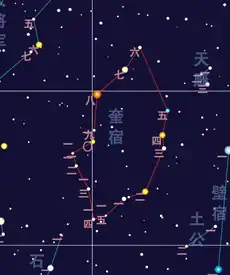Kui Mulang
Kui Mulang (Chinese: 奎木狼; lit. 'The Wood Wolf of Legs') is a deity in traditional Chinese spiritual beliefs.[1][2] He is considered to be one of the 28 Mansions, which are Chinese constellations. These constellations are the same as are studied in Western astrology. Kui Mulang originated from the ancient Chinese worship of the constellations, a spiritual practice that combines Chinese mythology and astronomy. Kui Mulang appears in Chinese mythology and literature, notably in the novels Journey to the West and Fengshen Yanyi.[3]
| Kui Mulang | |||||||
|---|---|---|---|---|---|---|---|
 The painting picture of Kui Mulang | |||||||
| Traditional Chinese | 奎木狼 | ||||||
| Simplified Chinese | 奎木狼 | ||||||
| Literal meaning | The Wood Wolf of Legs | ||||||
| |||||||
Star location

Kui Mulang is associated with the constellation Andromeda, which appears in the sky in the middle of November. Andromeda has a spiral nebula, which is a small universe about 2.5 million light-years away from Earth. In this constellation is Kui Xiu, described as the "four-legged fish palace" of Heshansu (和善宿) because its shape is similar to a fish. Indian mythology also references this constellation, also calling it a "fish palace."
Another constellation, the White Tiger, is also associated with this cluster of stars.[4]
Mythological records
According to the novel Investiture of the Gods (Fengshen Yanyi), Kui Mulang may be related to Li Xiong who was deified after he died in the Battle of the Ten Thousand Immortals. Kui Mulang is also linked to a historical figure called Ma Wu, a general who hailed from the town of Huyang in Tanghe, located in the Henan province.[5]
Journey to the West
In the classic Chinese novel Journey to the West, Kui Mulang appears as a demon named Yellow Robe Demon (黃袍怪). He lives the Moon Waves Cave (波月洞) on Bowl Mountain (碗子山) in the Kingdom of Baoxiang (寶象國). In his past, the Yellow Robe Demon falls in love with the Jade Maiden (玉女) in Heaven and decides to elope with her. He becomes a demon lord and the maiden is reincarnated from a goddess to a human who is named Baihuaxiu (百花羞). She is the third princess of the Kingdom of Baoxiang. The demon then kidnaps the princess, though she has no memory of her existence as a Jade Maiden. He marries her and the couple has two children.[3][6][7]
The Yellow Robe Demon then learns that the Buddhist monk Tang Sanzang has arrived at his mountain. According to tradition, the Yellow Robed Demon knows that eating a monk's flesh will grant him immortality. Thus, he captures Tang Sanzang. Learning of their master's capture, two of the monk's disciples, Zhu Bajie and Sha Wujing, endeavor to save their master. However, in battle, they are no match for the demon.
Zhu Bajie goes to the Sun Wukong and asks for help battling the Yellow Robed Demon. Sun Wukong had previously banished Tang Sanzang for killing the White Bone Demon. However, they share a common enemy in the Yellow Robed Demon, as Sun Wukong had previously tried to defeat the Yellow Robed Demon and failed. Thus, Sun Wukong now pleads with the Heavens for additional help. The Heavens see an opportunity in the request, as they are missing a constellation. So, the Jade Emperor sends all 27 constellations to capture the demon, which is the source of his power. Wukong also seeks help from the Heavens to track down the demon and learn his true identity. The demon is revealed to be a disguised as Revatī, the Wood Wolf of Legs (奎木狼), a star deity in the heavenly court, and one of the 28 Mansions. The Jade Emperor discovers that one of the 28 Mansions is missing, so he orders the remaining 27 to subdue the demon. The Wood Wolf is then subdued and brought back to Heaven. As punishment, he is ordered to become a furnace keeper under Taishang Laojun.[3][8]
References
- 最强天庭系统 (The strongest heavenly system) (in Chinese). renshenchujiu.
- "奎木狼、黄袍怪为何比牛郎织女幸福?". 知乎专栏 (in Chinese). 29 August 2017.
- "难怪奎木狼装不认识孙悟空,原来怕悟空知道他与玉帝之间的秘密?_玉女". Sohu (in Chinese). 17 September 2018.
- "15,奎宿 (奎木狼) - 初恋星座网". www.chulian.cn.
- Yap, Joey (2015). Qi Men Dun Jia: 28 Constellations. Joey Yap Research Group. ISBN 978-967-0794-54-9.
- "百花羞为什么不认奎木狼?原因是什么". Qulishi (in Chinese). 5 April 2019.
- "西游黄袍怪:前世相恋,今生相怨". 豆瓣 (in Chinese). 20 March 2018.
- 中文經典100句: 西遊記 (in Chinese). 商周出版. 2008. ISBN 978-986-6571-26-8.